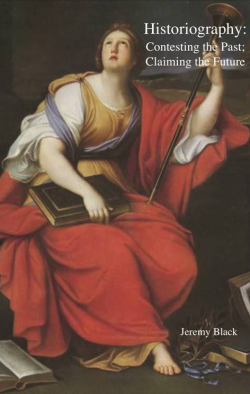 In trying to understand why students dread historiography, I came across several works by Jeremy Black, a prolific military historian. In his recent Historiography: Contesting the Past; Claiming the Future
In trying to understand why students dread historiography, I came across several works by Jeremy Black, a prolific military historian. In his recent Historiography: Contesting the Past; Claiming the Future, Black describes the current approach to teaching the subject and why it often fails.
The conventional pattern at present is that of a compulsory first-year course on historical method and theory, including historiography, with no other course being compulsory. In many respects, these courses are failures, in part because the students are often bored, being relatively uninterested in theory. Moreover, the students have relatively little experience of studying history at an advanced level, and thus much about the course does not make sense (233).
In my current graduate work, as was the case with my undergraduate work, the first two courses I am supposed to complete are HIST500 – Historical Research Methods and HIST501 – Historiography.
Are these courses failures? I would not go that far, but I do not think they are raging successes. Students learn methods and theories predominately through anecdotes.
Black suggests a different approach with teaching historiography.
I suggest, instead, that this teaching be switched to the final year when the students are more mature intellectually and have done more work on which to base their arguments and assessments. I would make such a course the last of a sequence of compulsory core courses (233).
The idea is intriguing. Instead of a student learning these concepts through spoon-fed anecdotes, the student would bring forth his or her own experiences and studies, or at least be forced to look at their studies in a new light.
Black then breaks down how he would teach history in Britain, but the approach can apply to other programs in different countries. For example, applying the concept to my current Ancient and Classical program at AMU, my order of courses would appear as follows.
- HIST597 – Graduate Seminar in European History
- HIST531 – The Greek Civilization
- HIST532 – The Roman Republic and Empire
- HIST533 – Late Antiquity and Byzantium
- HIST500 – Historical Research Methods
- HIST501 – Historiography
By the time I would have reached research methods and historiography, I would have a slew of historical background at an advanced level with which to discuss methods and theories.
I ran the concept by a several fellow students and the responses were borderline defensive. Most of them cannot even conceive of a world where you do not start with research methods and historiography. As one told me, “You have to learn to walk before you can run.”
Yet, I am knee deep in a seminar course of European History and thus far, I have digested three books:
- The Crusades, Christianity, and Islam
- The Debate on the English Revolution
- Origins of the French Revolution
In some instances, I have sought out other works to understand the histories of the periods, as these works are almost entirely historiography. Meaning, this single course has exposed me to a slew of historiographical analysis using fresh examples, which will stick with me longer. In addition, bringing my experience from this course to a pure historiography course, I am equipped with plenty of examples with which to understand the methods and theories.
Black’s idea is radical, but I think he is onto something.
